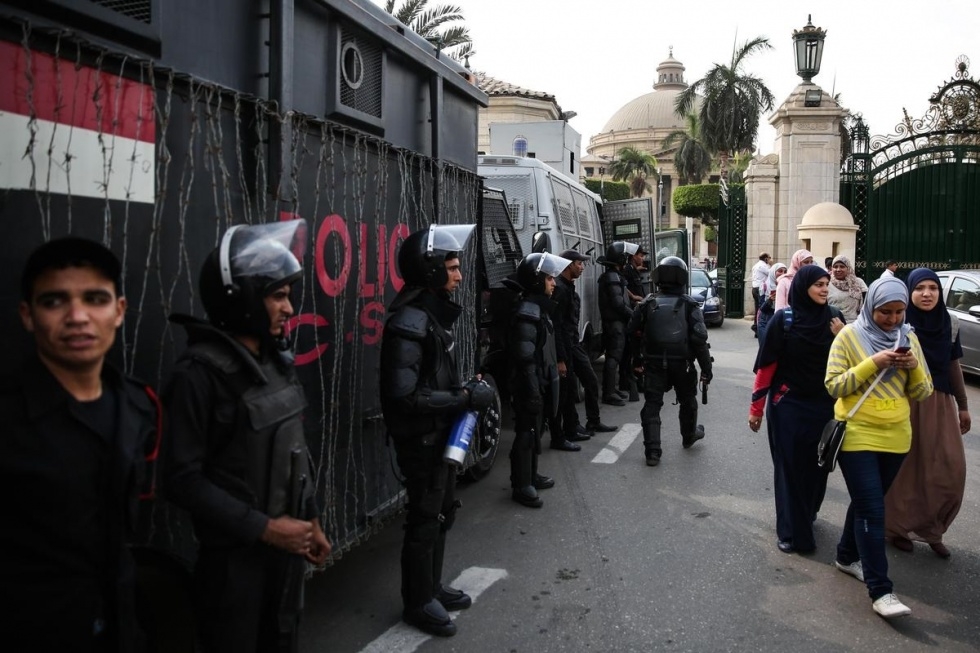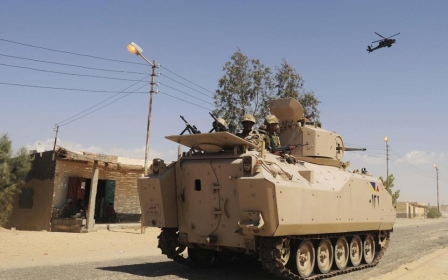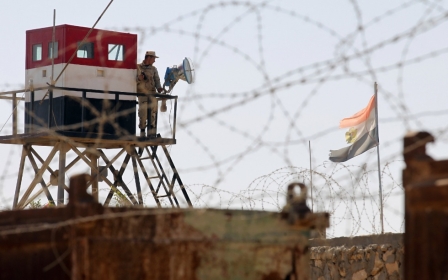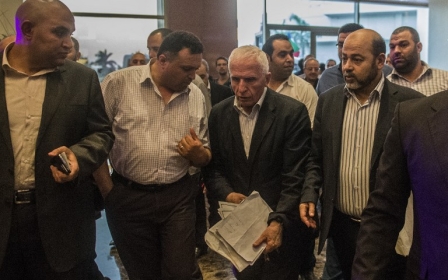Egypt’s crackdown on freedoms broadens

Public universities - where students have been protesting since the start of the academic year this October - will come under army protection and anyone accused of sabotaging them will face military courts, Egypt’s Prime Minister Ibrahim Mehleb said on Monday, according to the state-run Ahram Online news website.
Mehleb’s statement further clarifies the jurisdiction of a new law that was issued by President Abdel Fattah al-Sisi yesterday allowing the country’s army to assist the police with guarding public institutions for a period of two years. Anyone accused of crimes against these institutions will be referred to military courts, the government decree said.
The law also includes Egypt’s electricity network, natural gas pipelines, oil fields, railway lines, roads, and bridges, presidential spokesman Alaa Yousef said.
The move comes as the government continues to face pressure to take a hard line against militants that have been waging an insurgency in the Sinai Peninsula where at least 31 soldiers were recently killed in two attacks. Attacks have also been increasingly occurring in other parts of the country, including the capital, since the July 2013 ouster of former President Mohamed Morsi.
Rights groups, however, are concerned that the new law will be used to further a crackdown that has already seen thousands of protesters jailed, many without due process. The whereabouts of one prominent blogger Alaa Abdel Fattah, who was arrested on Monday, remains unknown, according to his wife.
The impact of the law may already be felt. A small protest by students, affiliated with the Muslim Brotherhood - designated a terrorist group by the Egyptian government - that blocked a road in Cairo was immediately broken up by nearby security forces today, Egyptian private daily Al-Masry Al-Youm reported.
And Ain Shams University, a public institution, witnessed an increased presence of the university’s security administration and private security firm Falcon, but there was no presence of the army, the same newspaper said.
Rights activists are also increasingly concerned about the lack of due process and repression of people’s rights that the new law could entail. Diana al-Tahawy, director of the Criminal Justice Unit at the Cairo-based Egyptian Initiative for Personal Rights, told the news website Mada Masr that “due process, which has already been compromised by regular courts, will come under greater threat.”
Mahmoud Salmani, from the activist group No to Military Trials for Civilians, told Mada people often block railways to complain of shortages of basic services, such as water. The law could mean these people will face military trials for demanding their basic rights, he said.
Broad crackdown
The Egyptian government has launched a broad crackdown against a broad range of dissenting voices - targeting the Muslim Brotherhood and secular youth activists alike. At least 16,000 have been imprisoned since July 2013, according to official figures, and over 40,000 according to activist figures.
However, the crackdown has taken a new turn after the recent attack on soldiers. The government has now declared a state of emergency in the Sinai and issued the law on the army’s new role in securing public facilities.
Yesterday, the chief editors of 17 state and privately-owned daily newspapers said in a joint statement that they would stop publishing statements that undermine the performance of state institutions, including the army, police and judiciary, according to Ahram Online. The paper editors said they would no longer publish statements “supportive of terrorism or that undermine state institutions directly or indirectly.”
Al-Shorouk newspaper was among the signatories. Until now, it had been seen as one of the only spaces for voices critical of the government, where critics such as former member of parliament Amr Hamzawy, writer Fahmy Howeidy, and novelist Ahdaf Soueif - whose nephew Alaa Abdel Fattah and niece Sanaa Soueif are in jail for protesting - write regular columns.
The popular Egyptian television host Mahmoud Saad was suspended from appearing on his show after one of his guests made an apparently demotivating comment about the Egyptian army when she recalled its 1967 war defeat against Israel. The suspension was condemned by the non-governmental Arab Network for Human Rights Information as an affront to media freedoms in the country, and was slammed as a signal that television broadcasters may also follow suit from the pledge by newspaper editors.
“Put your ethics aside and become a fascist,” newspaper columnist Mahmoud al-Kardousi told Sisi in an address published by Egyptian daily al-Watan.
Egyptian civil society actors are also under increasing pressure as the 10 November deadline for non-governmental organisations to register under a law, giving the state greater control over their activities, gets closer. Domestic and international rights groups, such as Amnesty International, have urged the government to withdraw the legal requirement, saying it contravenes international human rights standards.
Middle East Eye propose une couverture et une analyse indépendantes et incomparables du Moyen-Orient, de l’Afrique du Nord et d’autres régions du monde. Pour en savoir plus sur la reprise de ce contenu et les frais qui s’appliquent, veuillez remplir ce formulaire [en anglais]. Pour en savoir plus sur MEE, cliquez ici [en anglais].




